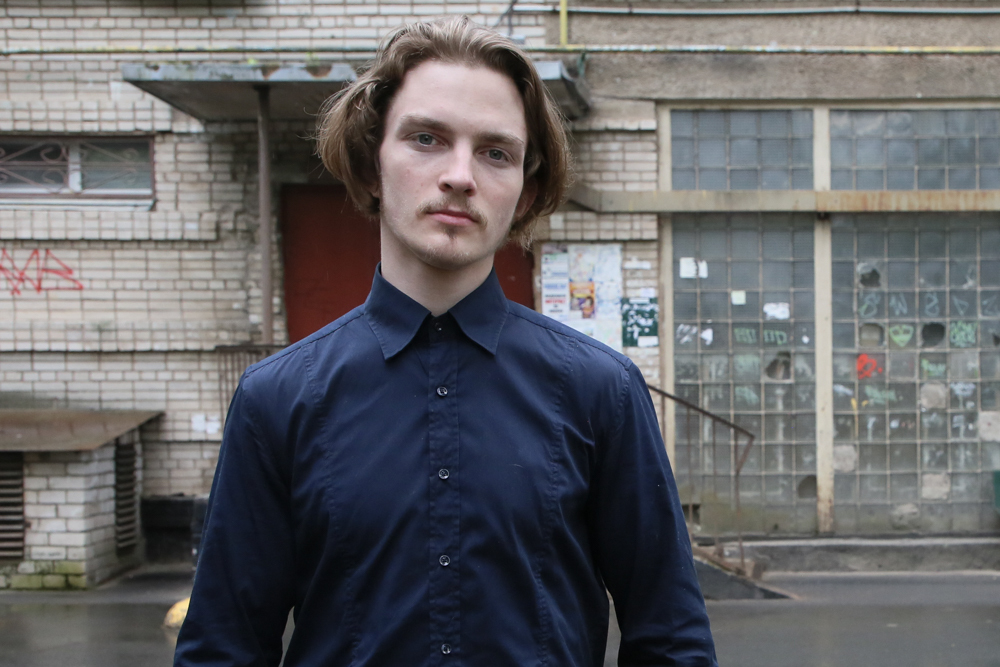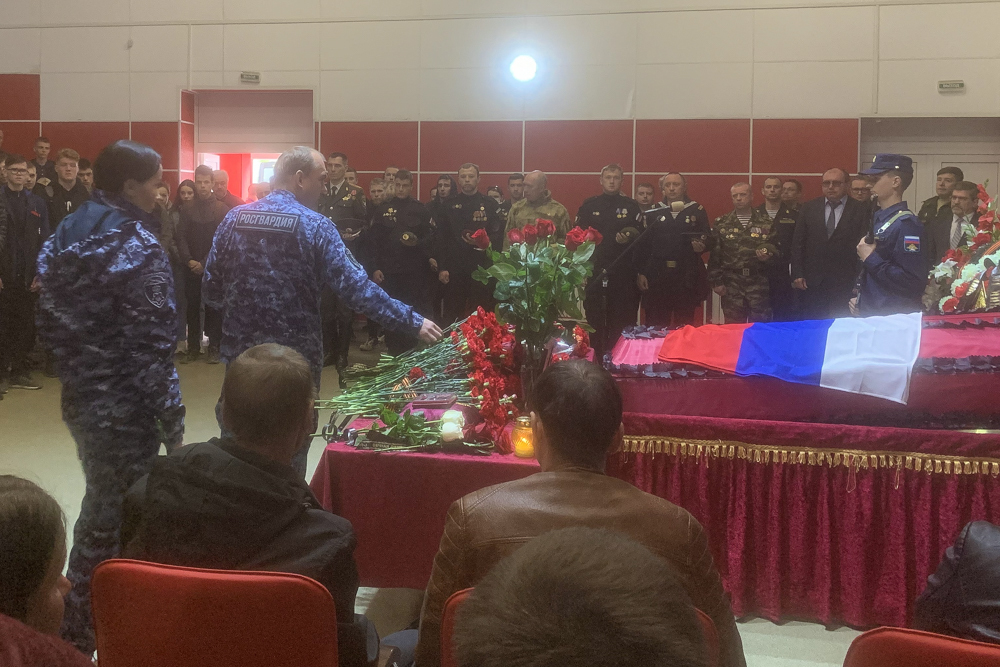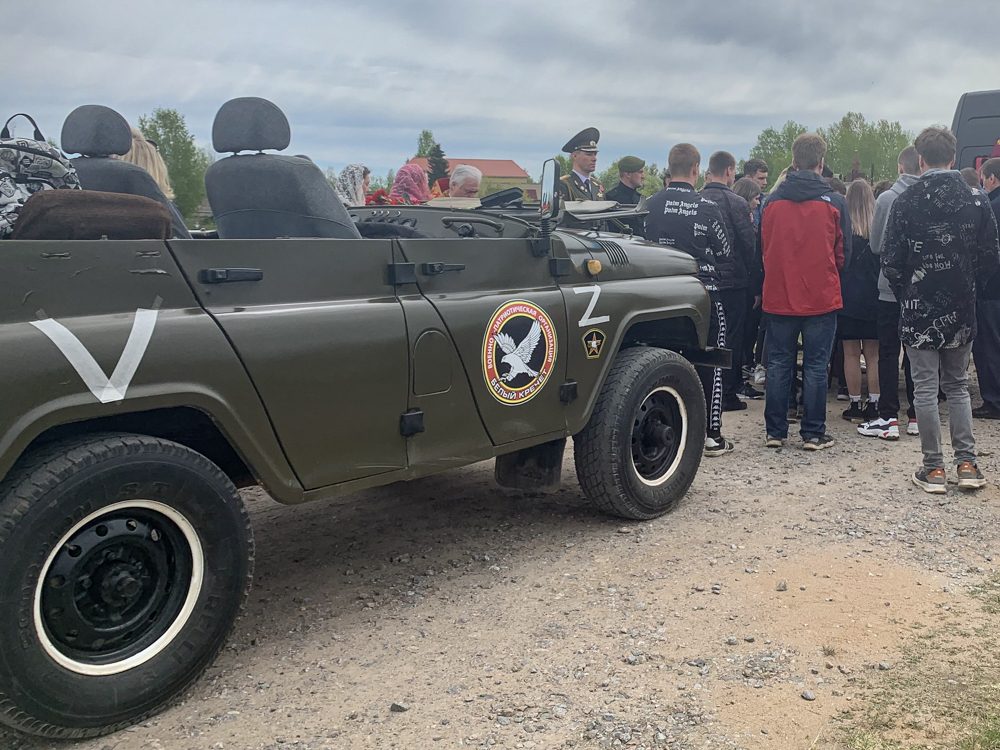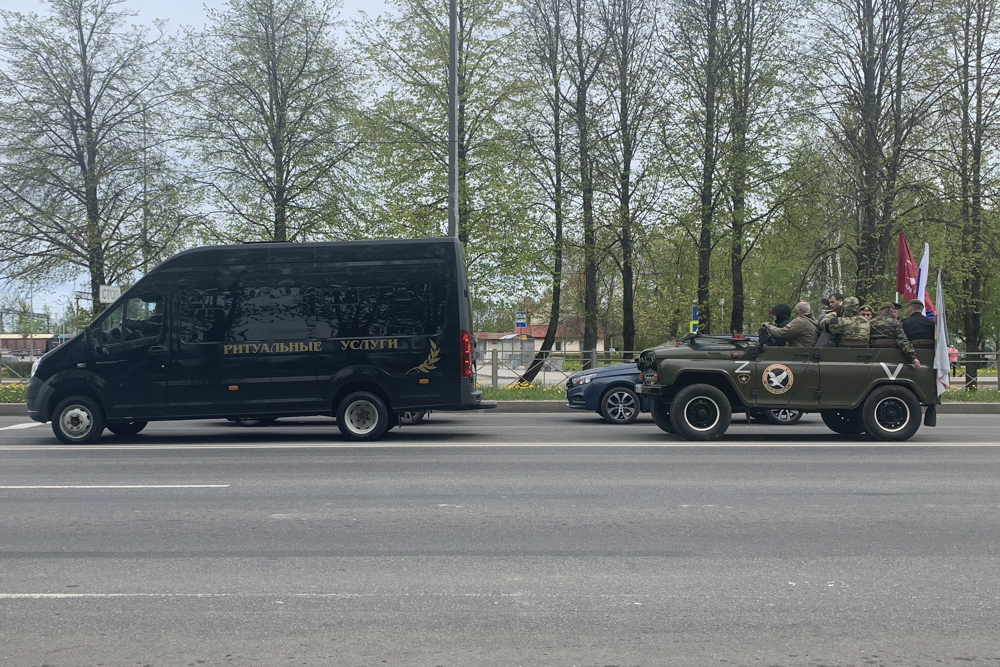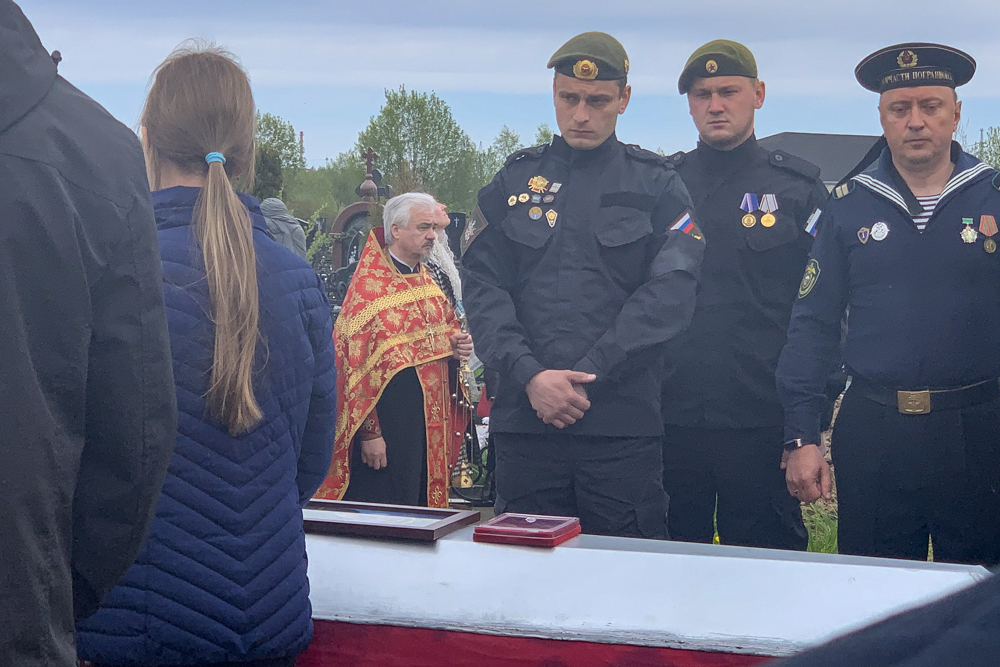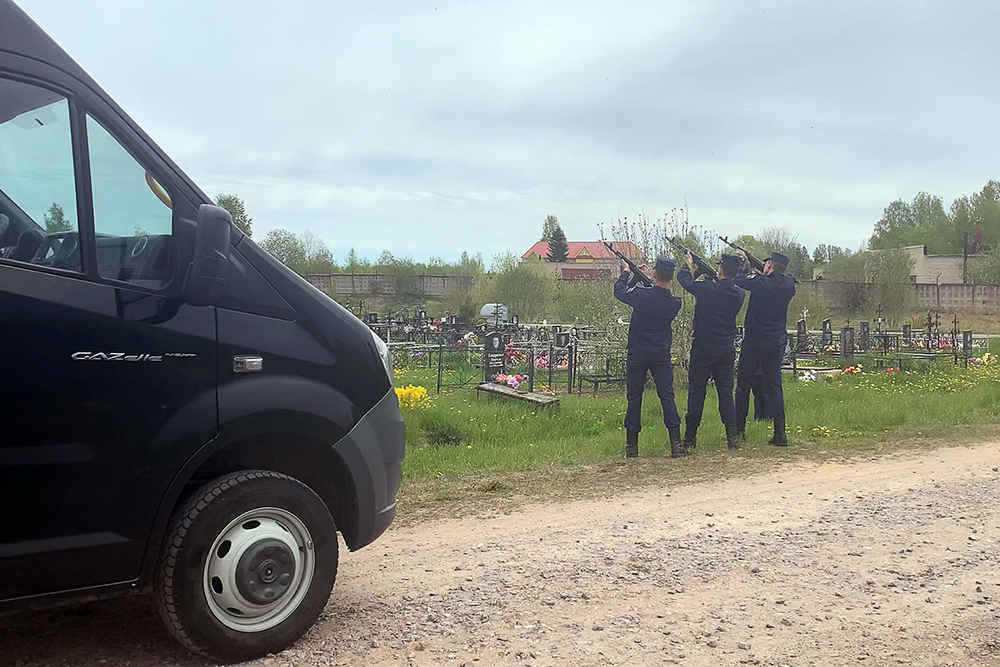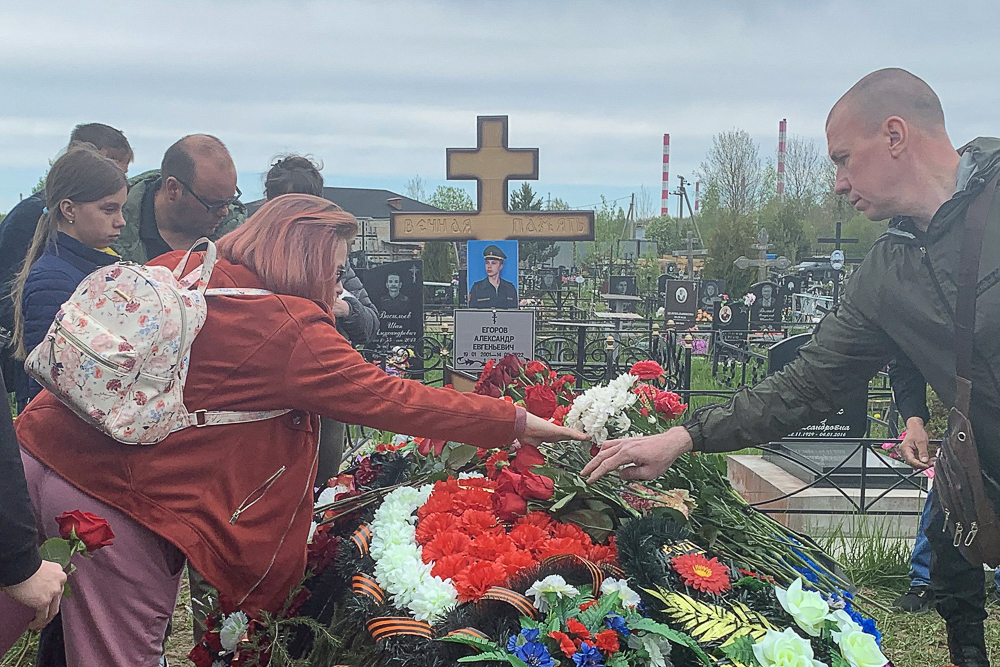On May 26, Kirishi bid farewell to Alexander Yegorov, a contract-service marine who was killed in Ukraine. Paperpaper.ru‘s correspondent describes Alexander’s funeral and what his loved ones say about his military service and the circumstances of his death.
Paperpaper.ru is grateful to Thomas Campbell for translation our report and publishining it on therussianreader.com.
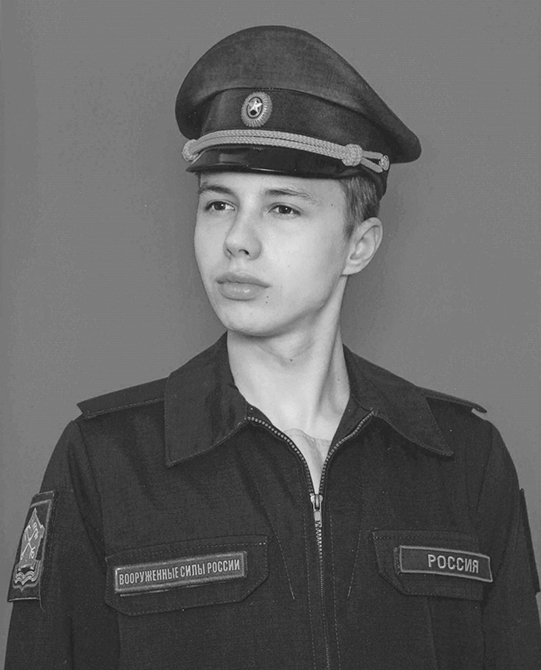
Groups of people gather outside the Sunrise Youth and Leisure Center in Kirishi. Almost everyone is holding red carnations — they have come to a civil memorial service for guards marine Alexander Yegorov. One of the deceased man’s twenty-year-old friends has brought black roses. Yegorov’s friends and classmates are followed by a group of distant relatives and teachers. Russian National Guardsmen and military servicemen stand each in their separate groups. Gradually, people converge in a long queue. The queue is headed by a boy of about ten years old in a camouflage uniform, combat boots, and beret, along with an old woman wearing a headscarf.
A military band greets those entering the funeral hall. People lay flowers on a table near the coffin, which is upholstered in red cloth. A Russian flag has been draped over the coffin. Yegorov’s father, mother, and twelve-year-old sister are seated near the coffin. People go up to them, express their condolences, and hug them.
Opposite Yegorov’s close relatives stand medal-bedecked military men, solemnly holding their caps in their hands. The ten-year-old boy in camouflage uniform stands in the center of the hall. Like the adults, he holds his beret in his hand. Two young guards armed with machine guns stand on honor duty near the coffin.
A local councilman in a suit jacket ushers the father of the deceased to the microphone. It is hard for him to talk. He cries, barely able to stand on his feet.
“He wanted this himself. He went on his own accord — a real man. As they said, he saved a comrade… I have also been in combat, I know what it is like. Our friend, our son, is no longer with us. I can’t say anything more.”
Yegorov’s father is followed by members of the Kirishi district council. The words “demilitarization” and “denazification” crop up often in their speeches. “We watch TV, we know everything,” one of them says. Another ends his speech by repeating the president’s quote from the Gospel: “There is no greater love than if someone gives his soul for his friends.”
A minute of silence follows. Then a vocational college teacher recalls that Alexander was “not a hooligan” as a student. He says that Alexander would have been an excellent welder.
One of the military men haltingly recounts Yegorov’s act of heroism. Alexander “personally knocked out two enemy tanks” and went to provide first aid to a comrade, but died on the battlefield “as a result of hostile artillery fire.” The military man announces that Alexander has been awarded the Order of Courage posthumously by presidential decree for his courage and heroism.
Anton, a close friend of the deceased, is the last to speak. He is wearing an overcoat and black gloves. It was he who brought the black roses.
Alexander’s friend Anton:
“Sasha loved style and was well-groomed. He always wore black gloves, chains, and watches, and loved expensive whiskey. He was quite pretentious and finicky. He was obsessed with business. He was an unusual guy. Since he was charismatic and handsome, many girls fell in love with him, almost all of them. He should have worked as a model. We’ve known each other for fourteen years, we went to the same school. Then we went to vocational college. Sasha studied to be a welder, while I studied to be an auto mechanic, but we saw each other often. He was really into personal growth. He was interested in relationship psychology, business, and marketing, and was an excellent binary options trader. He was always on the lookout for information and constantly learning things. He liked to read books. He really liked the books The Richest Man in Babylon and Personal Development for Smart People. And he gave me relationship advice and helped me find girls, like a personal psychologist.”
In his eulogy, Anton admits that he had a falling out with the deceased a year ago, that he would like to ask him for forgiveness and hopes that all his friends will forgive Alexander and that Alexander will forgive all of them.
Someone in the audience shouts, “What are you talking about, you fucking idiot!?”
The speeches are over. The military band plays. One of the council members invites everyone to travel to the Meryatino cemetery.
Alexander’s friend Anton:
“He wanted to dodge the draft at first, to not join the army, but last year he decided to go. I don’t know exactly what happened. Maybe it was quarrels with friends that incited him. He had begun to behave very rudely and disrespectfully towards me and often had arguments with others. He and I communicated less often — he was a high-maintenance guy.
In the army, he wrote that he felt abandoned. I would guess that he joined the army for the money, and he needed the money to implement his big plans. He wanted to create his own clothing brand, launch a business of some kind, and get rich himself to help others get rich.
It is possible that his father urged him to serve in the army, like, ‘it’ll make you a man,’ and his father was an authority figure to him. Not that he actually said, “Go into the army, you need to become a man,” but Sasha took his words to heart. He was always independent. He hadn’t wanted to join the army until the last moment, but either his father said something to him, or he just wanted to avoid the difficulties that could arise when applying for a job [for failing to perform his mandatory military service].”
On the way to the cemetery, a military UAZ off-road vehicle with an open top, the letters Z and V pasted on its sides and flying three flags, cruises behind the van carrying the coffin. In the car, among people in military uniform, sits the father of the deceased in civilian clothes, his face turned into the wind.
At the cemetery, the zinc coffin’s lid is removed. There is a small aperture around the deceased’s face, and a photo of Alexander in military uniform has been placed on the center of the coffin. We are seemingly given the chance to compare the person before he went into the army and afterwards. People stand by the coffin for a long time, peering at it and saying their farewells.
“Mom, this is our little son!” the father of the deceased screams, turning to his wife. Both of them fall on the coffin, hugging the zinc.
The burial rites begin. The father becomes faint and falls over. People prop him up and put him in the military vehicle, where he sits with his eyes half closed. Two girls sing “Christ is risen from the dead, trampling death by dying.” Some people cross themselves. Nearby, a group of military men discuss the circumstances of Alexander’s death in a low voice. One of them has served in Ukraine, apparently.
“A large piece of shrapnel got under his helmet, and small pieces, minor stuff, struck his bulletproof vest. They broke his ribs.”
“And the one he saved, did he survive?”
“I don’t know, he’s in the hospital. They [Ukrainians] were prepared. Everything there is dug up, crisscrossed with trenches. There was preparation.”
The knowledgeable young man continues.
“Not that there are no connections. Using phones is forbidden. There are cellular connections only in certain places. If they [soldiers] go up to a cell tower [to get a better connection], sooner or later [the Ukrainians] get a fix on them, just like our guys get a fix on them.”
Alexander’s friend Anton:
“As I was told, Alexander at first served in Kaliningrad in the motorized infantry, but then he was sent to a repair battalion when they found out that he was a welder. While he was doing his [obligatory] service, he signed a contract [to continue his service as a paid volunteer serviceman], thinking that he would go to Syria. Who knew that the war would begin? He had signed a contract. The war began and [instead of] Syria, he was sent to Ukraine.
We did not communicate when he was serving in the army, but four months later he called me and apologized for everything. He seemed to have said goodbye to everyone in advance, saying that he would soon be gone. He wrote me big congratulatory ‘poems,’ and said he missed me. And he wrote messages to everyone about how he wanted to see them take off. He told me that he hoped I would become a hotshot masseur. He told a friend that she would be able to become a streamer, and told another friend to find himself. That’s what he is like — a spiritual mentor. Shortly before his death, he wrote a very heartfelt letter to his parents, but no one read it except his father. It was probably quite personal.”
The burial rites end, the funeral march plays. The father of the deceased has come to his senses. He approaches the coffin again and hugs his wife. At this moment, everyone shudders as shots are fired. The honor guard is concealed from Yegorov’s relatives and friends by the funeral home van — no one expected the shots. People instinctively duck, and the father covers his ears with his hands.
The coffin is lowered into the grave.
People reassure that the Snickers have been put in the coffin, but the father rushes at the grave anyway.
“Forgive me, son, I didn’t want to get you…”
Two comrades try to hold him back by force. The people around him admonish him.
“Your son is a hero, but you…”
Three gravediggers begin filling in the hole. The father escapes and runs up to it again. One of the gravediggers roughly pushes him away. The father falls.
“Someone give him smelling salts.”
Alexander’s friend Anton:
“[Alexander] told me that a phone had been found on someone in his unit. They wanted to arrest the guy, because phones are banned in their unit. But Sasha made an agreement with the person who wanted to arrest him, and gave him his own phone so that there would be no problems for the other guy. Sasha always stood up for his friends. He gave a lot of things away and protected his friends — friends were very important to him. He sacrificed a lot and shared a lot, whether it was money or knowledge. He wanted his friends to be successful too. He wanted to help them grow up and achieve something, to find themselves, to help them start doing something. I told him quite often during his lifetime that I loved him. Many people loved him, and he loved them too.”
The gravediggers cover the mound of dirt with fir branches, and then people come up and lay flowers atop the branches. Having calmed down, the father holds his own tiny, intimate ceremony involving church candles. Then he turns to the young people in the crowd, his son’s classmates, and invites them to the wake.
As you leave the town of Kirishi, on the left side of the highway, you see the ruins of a building that has not been completely demolished. Coming closer, you realize that this is the Echo of War monument: the ruins of a pre-war factory boiler room. The description says that the monument serves as a reminder to future generations of war’s horrific consequences.
Help independent journalism — save the freedom of speech
Paperpaper.ru — is independent media from Saint-Petersburg, Russia. We’ve been reporting on the Russian-Ukrainian war since the day it started. As a result, our website was blocked by the Russian government.

